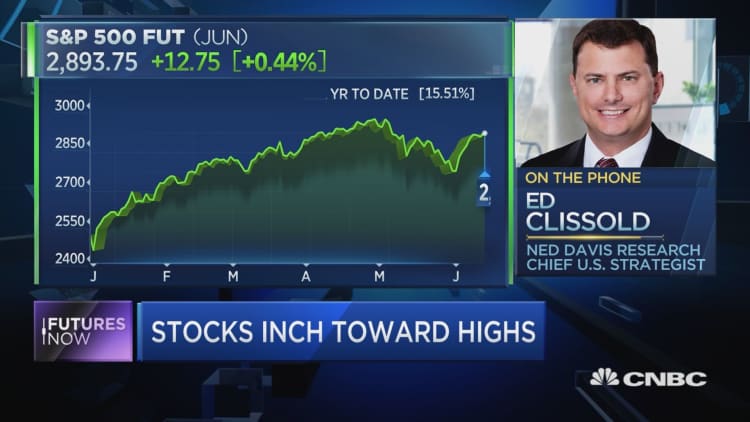
The word of the year in the U.S. stock market is uncertainty.
Uncertainty around U.S. trade policies, geopolitical tensions and the Federal Reserve's inclination to cut interest rates has largely kept a lid on stocks this year after the reached an all-time high in late April. It has also led strategists like Ed Clissold of Ned Davis Research to maintain their year-end targets, while warning that the path there could be choppy.
"It's pretty clear the economy is slowing, but every time we get a few bad data prints, there's a lot of focus on whether or not we're going into a recession," Clissold, whose S&P target for the end of 2019 is 2950, said Thursday on CNBC's "Futures Now." "If we're not, then the market's in pretty good shape."
But "pretty good shape" means a few different things to Clissold, Ned Davis' chief U.S. strategist who called the stock market's 20% plunge in December.
"We think it's going to be a choppy market from here, and so 2950 is in line with what you'd expect over the long run from the S&P," he said. "But you'd get some pullbacks and opportunities to get in at a little bit more attractive prices as we go for the next few months."
Clissold has also been keeping an eye on market sentiment, which often serves as an indicator for where stocks could go next.
"The correction [in] the last few weeks removed some of the excess optimism and that allowed for the market to move to new highs," he said. "But ... if we start spiraling towards a recession, if we get too far gone, a couple rate cuts isn't going to be enough to pull us out and then it could be a much rougher situation."
As such, Fed officials — who will meet next week — have to tread carefully as they consider cutting interest rates, Clissold said.
"I think it's unlikely the Fed is going to actually make a cut in the near term unless we get worse data," he said. "But here's a quick data point for you: usually, the market does very well — up double digits — after the first rate cut, but the last two times, it hasn't. But those were also the only times the Fed actually cut and then we went into recession afterwards. So, in 2001, 2007, the Fed tried to save the market, but they did so too late. So that's what we want to be looking at."
In the meantime, Clissold recommended that investors opt for stocks that tend to outperform regardless of the economic layout.
"We have sluggish growth. That's what growth stocks love," he said, acknowledging that, if the economy does go into recession, "defensive value" stocks like utilities, consumer staples and telecommunications names would win out.
"But if it's this slow, steady slog, that's when you want to be in tech and consumer discretionary, the big growth names," he said.
Stocks erased their losses on Friday after falling earlier in the session as concerns around weakening data in China and trouble ahead for semiconductor companies gripped the market.



